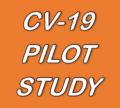Completely Anonymous Study
A Review of COVID-19 Vaccine Use and Adverse Effects in U.S. Commercial Airline Pilots

Seeking truth through data collection
First-Ever Industrywide Research
"Aviation in itself is not inherently dangerous. But to an even greater degree than the sea, it is terribly unforgiving of any carelessness, incapacity or neglect." — Captain A. G. Lamplugh
The study of “Aviation Human Factors” came into vogue in the mid-1980’s after several airline accidents resulted from human error. As airplane technology and complexity increased, the exploration into how humans interact with machines and other pilots formed the foundation for “Crew Resource Management (CRM).” More recently, the focus turned to human performance, and CRM morphed into “Threat and Error Management (TEM).”
TEM theory posits that because human error is unavoidable, it is critical one develops skills to quickly identify threats that can lead to errors. If a threat is recognized early, it can be avoided or a plan devised to manage it. As a result, the few errors that do occur can be “trapped” and corrected before they snowball into a catastrophic event. Nowhere is this type of risk mitigation more practiced, and arguably more important, than on commercial airplane flightdecks. So successful is the TEM model, hospitals across America are adopting similar strategies and procedures for trauma and surgical teams. However, the theory is incomplete without the final piece—a performance evaluation, known as a “debrief.”
In an effort to reduce future errors, after every flight, commercial pilots ask ourselves, “what did we do well,” “what did we do poorly,” and “where can we improve.” Likewise, the military has long known that debriefing establishes the foundation for future mission success. By fully embracing the TEM model, US passenger airlines have enjoyed 15 accident-free years–the longest run in our nation’s history. A true safety culture is now at the forefront of all commercial aviation including airlines, corporate, freight, air ambulance, training, agriculture, fractional/charter operators, etc.
At the same time, the Federal Aviation Administration (FAA), the agency charged with safety oversight and regulation, certifies the health of every commercially rated pilot at least annually (bi-annually for Airline Transport Pilots). Regulators’ multi-pronged approach includes pilot physical examination, oversight, and establishing industry-wide protocols for nearly every medical malady. Pilots are limited to only FAA-approved over-the-counter and prescription drugs or medical appliances. The agency establishes recovery guidelines for everything from minor, in-office procedures to heart bypass surgery and tracks all treatments and provider visits for every certificated pilot in America, under threat of license revocation. Very few professions are as medically scrutinized or regulated as professional pilots.
Until recently, the FAA’s vaccine approval process was no less stringent. Prior to the pandemic, a new vaccine was traditionally subject to at least a year’s observation/trial period before authorized for pilot use. Yet, without regard for past practices, the FAA granted blanket approval for the COVID-19 vaccines a mere day after the Food and Drug Administration issued its Emergency Use Authorization.
This begs the question, “If safety is the industry’s primary goal, and debriefing leads to increased safety, should we not conduct a thorough debrief of the FAA’s pandemic response and the effects of vaccines and mandates on the US aviation industry?”
As a researcher at Oklahoma State University and grounded in true “Threat and Error Management” theory, I conducted the first-ever, nationwide anonymous study examining the effects of the COVID-19 vaccine on pilot health. All US commercial and military pilots, vaccinated or unvaccinated, were encouraged to participate as de-identified data was impartially collected impartially across all sectors.
Many have heard heart-wrenching stories of pilots grounded due to vaccine complications. At the same time, the internet is flooded with posts designed to sensationalize or generate “likes” and “clicks” by suggesting that every reported pilot illness is the result of the “shot.” This less-than-ethical conjecture cannot be validated or discounted without hard data. Data cannot lie. Data does not care for whom one works, one’s political flavor, or one’s motivations. As researchers, our goal was to anonymously gather the data to analyze and present in its purest form—an industry debrief.
Finally, while it is imperative that the industry honestly assess its pandemic response, the self-declared champions of safety–the pilot unions–turned their backs on our efforts. Perhaps they are concerned with what they believe we may find. Perhaps, they are happy to just move on. No matter the reason, the quest for the truth will not be deterred. Pilots are independent, critical thinkers. We are also leaders. I implore my fellow aviators to stand up and lead, even if your union will not. Together, we can debrief this mission toward the goal of improving safety for those we serve—the flying public. It is what we are trained to do and what we must do.
_________
The survey takes about ten minutes and branches depending if you chose to take the vaccine or not. Any dates about which you are not sure can merely be entered as the first day of the month in which you recall the event occurring. You can skip any questions about which you feel uncomfortable answering; however, once submitted, you cannot go back. Oklahoma State University’s Institutional Research Board granted this study it’s highest certification in anonymous human studies and is the keeper of the data which is hosted on the world-renowned Qualtrics platform. In other words, nothing ties you to your submission. The data collected will be used to advance aviation safety and may be published in peer-reviewed journals. No data will be disclosed for commercial benefit, and the researchers are receiving no compensation for their efforts.
Meet the Researcher
Captain Sherry Walker seeks truth through data-driven research. You can learn more about her by clicking the “Learn More” button.











